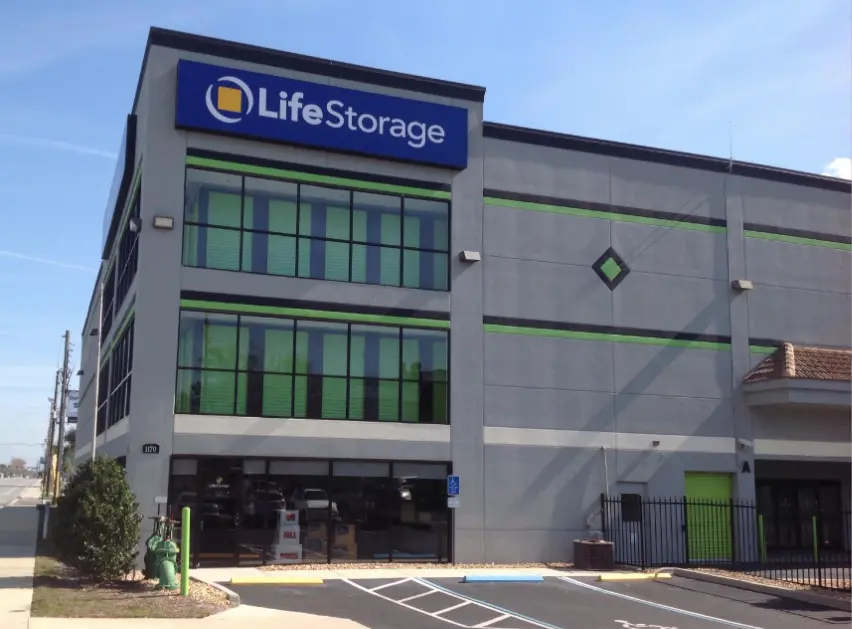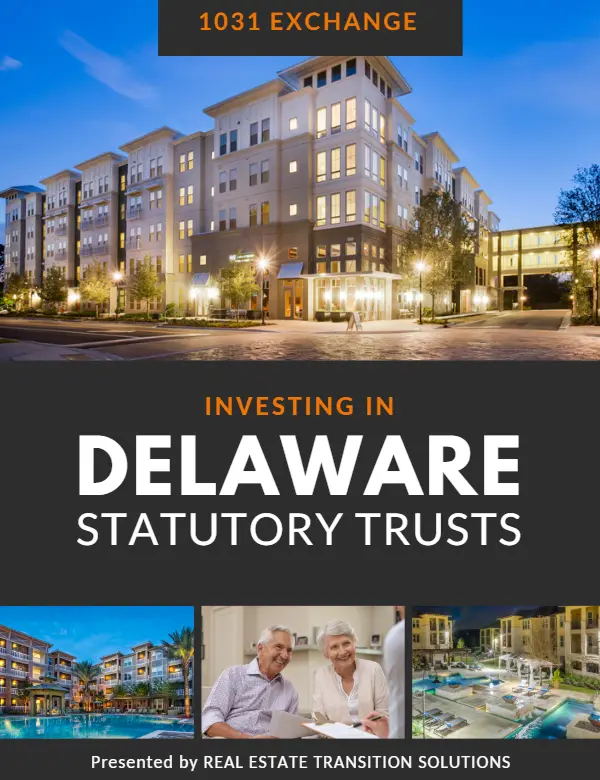How to Evaluate DST Properties
for Your 1031 Exchange
Due Diligence With DST Properties
Delaware Statutory Trust (DST) properties have become increasingly popular as ideal replacement options for 1031 Exchanges. This ownership structure not only qualifies for 1031 exchange tax deferral but also grants investors access to premium-grade assets situated in desirable market locations, thereby enhancing income potential while mitigating risks through diversification.
Nonetheless, exercising due diligence becomes paramount for investors aiming to make well-informed decisions that align with their financial and lifestyle objectives. Whether conducting individual research or seeking guidance from professionals (RETS boasts an exceptional in-house due diligence team), many factors demand consideration, including DST sponsor and investment structure, analyzing property type and tenant dynamics, evaluating the market and neighborhood dynamics, and understanding the local economic and regulatory environment.
This article provides an introduction to 7 focus areas for DST due diligence along with a checklist of common mistakes made with DST property evaluation.
What Are DST Properties?
DST properties are real estate assets structured as Delaware Statutory Trusts (DST). A Delaware Statutory Trust is a real estate ownership structure where multiple investors each hold an undivided fractional interest in the holdings of the trust.
The trust is established by a professional real estate company, referred to as “DST sponsor”, who first identifies and acquires the real estate assets. As individuals invest, their investments displace the capital used by the DST sponsor to acquire the property until it is eventually wholly owned by the investors. Investors own a beneficial interest in the trust. This means that investors hold a percentage of the ownership, and no single owner can claim exclusive ownership over any specific aspect of the real estate.
The DST ownership structure comes with many advantages, including tax benefits, income potential, the opportunity to buy ownership in an institutional-quality asset and—perhaps most notably—DSTs are eligible for 1031 exchanges.
DSTs stand out as a 1031 replacement property option for investors seeking passive income potential and diversified risk by allocating their 1031 exchange proceeds across multiple institutional-grade DST properties that are typically much larger and out of reach of most individual investors.
Types of DST Properties
Most commercial real estate property types are commonly held as DST properties, including the four major property types – multifamily, office, industrial, and retail – as well as specialized types such as senior housing, medical office, and self-storage.
DST real estate primarily consists of top-tier assets that offer attractive income potential and are considered institutional-grade. These assets usually come with substantial price tags, ranging from $30 million to $100 million, making them beyond the reach of individual investors. However, DSTs provide a solution by offering fractional ownership, enabling investors to access these opportunities.

Multifamily DST Property
A multifamily DST property refers to a residential property, such as an apartment complex or a residential community, that is owned and managed by a Delaware Statutory Trust. Investors can participate in fractional ownership, benefiting from potential rental income and property appreciation.

Industrial DST Property
An industrial DST property represents commercial real estate used for manufacturing, distribution, or storage purposes. These properties may include warehouses, factories, or logistics centers, offering investors the opportunity to earn rental income from businesses utilizing the space.

Office DST Property
An office DST property involves commercial real estate that is primarily used for office spaces and business operations. Investors can take part in fractional ownership, earning income from leasing office spaces to various businesses or organizations.

Retail Lease DST Property
A retail lease DST property encompasses commercial properties like shopping centers or retail outlets. Investors in this DST property type receive rental income from retail businesses that lease space within the property.

Senior Community DST Property
A senior community DST property refers to real estate dedicated to housing and providing services for elderly residents. These properties may include independent living communities or assisted living facilities, offering investors the potential for income from senior residents' monthly fees.

Self-Storage DST Property
A self-storage DST property consists of facilities where individuals and businesses can rent storage units to store their belongings or inventory. Investors can earn income from the rental fees collected from tenants using the self-storage units.

Medical Office DST Property
A medical office DST property involves commercial properties specifically designed for medical practices, clinics, or healthcare-related services. Investors can earn rental income from healthcare professionals leasing the office spaces for their practices.
DST Investment Pros & Cons
One of the most important reasons to consider investing in a Delaware Statutory Trust (DST) is the potential to defer, lower, or even eliminate the tax liability associated with the sales of the relinquished property through a 1031 Exchange. DSTs also represent a favored passive real estate investment option, allowing investors to possess shares in institutional-quality properties without the obligation of direct property management.

Advantages of DST Properties
- Capital gains tax savings
- Greater income potential
- Institutional-grade properties
- Passive property management
- Risk diversification
- Tax savings for estate beneficiaries
- Low risk of exchange failure
- Ability to close quickly
Disadvantages of DST Properties
- Not risk-free, potential loss of principal
- Lack of liquidity
- Interest rate risk
- Changing market conditions
- Lack of management control
- Regulatory changes
The Role of DST Sponsors

The DST sponsor is the entity responsible for creating and managing the Delaware Statutory Trust (DST) offering. The sponsor is typically a national real estate investment company with expertise in identifying, acquiring, managing, and selling high-quality, income-producing properties.
They are important players in the DST market. They provide accredited investors with access to institutional-quality real estate investments and manage the risks associated with these investments. Some of the key responsibilities of DST sponsors include the following:
DST Acquisition & Formation
- Identifying and Acquiring Properties: The DST sponsor identifies potential investment properties, performs due diligence, negotiates purchase terms, and acquires the properties on behalf of the trust.
- Formation of the DST Property: Once a property has been acquired, the DST sponsor forms the DST and files the necessary paperwork with the Securities and Exchange Commission (SEC).
- Serving as Trustee: The DST sponsor is responsible for setting up the Delaware Statutory Trust, structuring it according to laws and regulations, and preparing the necessary legal and offering documents. The DST sponsor serves as trustee of the DST with responsible for managing the DST and ensuring that it complies with all applicable laws and regulations.
- Financing the DST Property: The sponsor secures financing for the properties, either through loans or equity investments
- Structuring the Investment: The sponsor structures the offering of the DST to investors, often creating an offering memorandum that outlines the details of the
investment, including the structure of the DST, risks, potential returns, and
property information.
DST Marketing & Management
- Property Management: The sponsor typically handles the management of the property, either directly or through hiring a property management company. This includes overseeing operations, maintenance, tenant relations, leasing, etc.
- Leasing Strategy: The sponsor develops and implements leasing strategies to attract and retain tenants. This includes setting rental rates, marketing the property to prospective tenants, and negotiating lease agreements.
- Regulatory Compliance: The sponsor ensures that the trust complies with all relevant laws and regulations, including those pertaining to securities laws, financial reporting and taxes.
- Marketing the DST: The DST sponsor markets the DST to accredited investors through broker dealers and registered investment associates.
- Distributing Income and Capital Gains: The DST sponsor distributes income and capital gains to investors on a quarterly basis.
- Reporting: DST sponsors are required to report to investors on a regular basis. This includes reporting on the performance of the DST, the income and expenses of the DST, and the value of the DST assets.
How to Evaluate DSTs for a 1031 Exchange

Due diligence is the process of conducting a thorough investigation of a property, including its financial, legal, and physical aspects, before making a final decision to invest. New DST offerings are introduced into the marketplace every week, and exercising due diligence becomes paramount for investors aiming to make well-informed decisions that align with their financial and lifestyle goals.
RETS utilizes a rigorous due diligence process to evaluate every DST property and offering considered for 1031 exchanges. This process provides an in-depth investigation to validate an investment thesis and includes an independent evaluation of physical and financial facts of a property.
Our due diligence process helps us determine if a property and investment strategy fits within our firm’s guidelines, and potentially matches clients-specific profiles. Many DST properties are not approved for public offering including instances where the property sponsor has a strong track record of consistent performance and financial stability.
DST Sponsor Analysis
Key aspects of sponsor analysis include an evaluation of the sponsor’s reputation and track record, experience in managing DST properties, and assessment of the sponsor’s financial stability. A financially strong sponsor is more likely to weather economic downturns and provide stable management for the DST property. Additional factors to consider include:
- Sponsor’s approach to structuring DST properties
- Sponsor’s investment strategy and how it aligns with the property offered
- Sponsor’s operational history and professional staffing
- Sponsor’s financial controls, asset management, and property management
- Sponsor’s consistency and transparency communicating with investors
- Sponsor’s fees and expenses relative to industry standards
- Sponsor’s scale, efficiencies, critical mass
DST Business Plan
Key aspects of the analysis of the sponsor’s business plan for the asset including the pro forma projections, adequacy of reserves, and sensitivity of financial outcomes due to potential market and economic change. Additional factors include:
- Property management strategy and capacity (third-party or in house)
- Exit analysis – how the property will be positioned for sale after the strategy is executed
DST Property Analysis
Key aspects of the evaluation include the building use and property condition, lease terms, appraisal, environmental conditions, and adequacy of insurance coverage. Additional factors include:
- The building’s adequacy to meet tenant needs
- Property characteristics that appeal to current and future tenants
- Competitive property features such as site access, amenities, and parking
- Forecasted rent growth under various property conditions
Market Analysis
Neighborhood Analysis
Tenant Analysis
Third-Party Reports
Common Mistakes with Property Evaluation
When evaluating a DST property, it is important to avoid making common mistakes and focus due diligence in critical areas. Here are 9 common mistakes investors make with DST property evaluation:
- Incomplete property inspection: A thorough property inspection is essential to identifying any potential problems with the property. An incomplete inspection could lead to costly repairs or unforeseen liabilities.
- Unverified financial statements and projections: It is important to verify the accuracy of the property’s financial statements and projections. Unverified financial statements could lead to inaccurate expectations about the property’s performance.
- Ignoring potential market fluctuations: The real estate market is constantly changing. It is important to consider the potential for market fluctuations when evaluating a DST property. Ignoring potential market fluctuations could lead to losses if the market turns against the property.
- Inaccurate cash flow projections: Cash flow projections are essential for determining the profitability of a DST property. Inaccurate cash flow projections could lead to financial losses.
- Overlooking fees and taxes: There are several fees and taxes associated with owning a DST property. It is important to factor these costs into the investment decision.
- Not researching local rental market: The local rental market is an important factor to consider when evaluating a DST property. A weak rental market could lead to vacancies and lower income.
- Ignoring potential liabilities: There are several potential liabilities associated with owning a DST property. These liabilities could include environmental liabilities, tenant lawsuits, and property damage.
- Not considering financing and interest rates: The cost of financing a DST property can have a significant impact on the investment’s return. It is important to consider the cost of financing and the potential for interest rate changes when making the investment decision.
- No clear exit strategy: It is important to have a clear exit strategy before investing in a DST property. This will help you to avoid being locked into an investment that is no longer performing well.
Need Help Evaluating DST Properties?
DSTs are a popular choice among passive real estate investors who seek fractional ownership of institutional-grade properties that can provide steady monthly income. Evaluating DST properties for your 1031 exchange requires a thorough analysis of key factors such as property type, location, cash flow, debt financing, management, tenant quality, sponsor reputation, and fees. By carefully considering these factors, you can identify DST properties that align with your investment goals and are a sound investment for your 1031 exchange. As always, it’s important to consult with a financial advisor or real estate professional before making any investment decisions.
At Real Estate Transition Solutions, we understand that every property owner’s situation is unique, and we are dedicated to finding tailored solutions to meet your specific needs. With our expertise and understanding of the nuances of co-ownership structures, we can guide you through the 1031 Exchange process with confidence. Contact Real Estate Transition Solutions (RETS) to speak with a licensed 1031 Exchange Advisor. We offer complimentary consultations that can be done over the phone, via video conference, or in person at one of our offices. To schedule your consultation, call 206-686-2211.
About Real Estate Transition Solutions
Real Estate Transition Solutions (RETS) is a consulting firm specializing in tax-deferred 1031 Exchange strategies and Delaware Statutory Trust investment property. For over 26 years, we have helped investment property owners perform successful 1031 Exchanges by developing and implementing well-planned, tax-efficient transition plans carefully designed to meet their objectives. Our team of licensed 1031 Exchange Advisors will guide you through the entire process, including help selecting and acquiring passive management replacement properties best suited to meet your objectives. To learn more about 1031 Exchanges and Real Estate Transition Solutions, visit re-transition.com or call us at 888-755-8595.
The information herein has been prepared for educational purposes only and does not constitute an offer to purchase or sell securitized real estate investments. Such offers are only made through the sponsors Private Placement Memorandum (PPM) which is solely available to accredited investors and accredited entities. DST 1031 properties are only available to accredited investors (generally described as having a net worth of over $1 million dollars exclusive of primary residence) and accredited entities only. If you are unsure if you are an accredited investor and/or an accredited entity please verify with your CPA and Attorney. There are risks associated with investing in real estate and Delaware Statutory Trust (DST) properties including, but not limited to, loss of entire investment principal, declining market values, tenant vacancies and illiquidity. Potential cash flows/returns/appreciation are not guaranteed and could be lower than anticipated. Diversification does not guarantee profits or guarantee protection against losses. Because investors situations and objectives vary this information is not intended to indicate suitability for any particular investor. This material is not to be interpreted as tax or legal advice. Please speak with your own tax and legal advisors for advice/guidance regarding your particular situation. Securities offered through Concorde Investment Services, LLC (CIS), member FINRA/SIPC. Advisory services through Concorde Asset Management, LLC (CAM), an SEC registered investment adviser. Real Estate Transition Solutions is independent of CIS and CAM.


